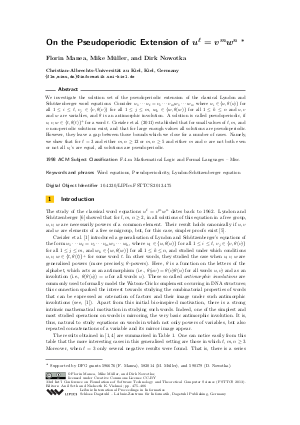On the Pseudoperiodic Extension of u^l = v^m w^n
Authors Florin Manea, Mike Müller, Dirk Nowotka
-
Part of:
Volume:
IARCS Annual Conference on Foundations of Software Technology and Theoretical Computer Science (FSTTCS 2013)
Part of: Series: Leibniz International Proceedings in Informatics (LIPIcs)
Part of: Conference: IARCS Annual Conference on Foundations of Software Technology and Theoretical Computer Science (FSTTCS) - License:
 Creative Commons Attribution 3.0 Unported license
Creative Commons Attribution 3.0 Unported license
- Publication Date: 2013-12-10
File

PDF
LIPIcs.FSTTCS.2013.475.pdf
- Filesize: 0.5 MB
- 12 pages
Document Identifiers
Subject Classification
Keywords
- Word equations
- Pseudoperiodicity
- Lyndon-Schützenberger equation
Metrics
- Access Statistics
-
Total Accesses (updated on a weekly basis)
0PDF Downloads0Metadata Views
Abstract
We investigate the solution set of the pseudoperiodic extension of the classical Lyndon and Sch\"utzenberger word equations. Consider u_1 ... u_l = v_1 ... v_m w_1 ... w_n, where u_i is in {u, theta(u)} for all 1 <= i <= l, v_j is in {v, theta(v)} for all 1 <= j <= m, w_k is in {w, theta(w)} for all 1 <= k <= n and u, v and w are variables, and theta is an antimorphic involution. A solution is called pseudoperiodic, if u,v,w are in {t, theta(t)}^+ for a word t. [Czeizler et al./I&C/2011] established that for small values of l, m, and n non-periodic solutions exist, and that for large enough values all solutions are pseudoperiodic. However, they leave a gap between those bounds which we close for a number of cases. Namely, we show that for l = 3 and either m,n >= 12 or m,n >= 5 and either m and n are not both even or not all u_i's are equal, all solutions are pseudoperiodic.
Cite As Get BibTex
Florin Manea, Mike Müller, and Dirk Nowotka. On the Pseudoperiodic Extension of u^l = v^m w^n. In IARCS Annual Conference on Foundations of Software Technology and Theoretical Computer Science (FSTTCS 2013). Leibniz International Proceedings in Informatics (LIPIcs), Volume 24, pp. 475-486, Schloss Dagstuhl – Leibniz-Zentrum für Informatik (2013)
https://doi.org/10.4230/LIPIcs.FSTTCS.2013.475
BibTex
@InProceedings{manea_et_al:LIPIcs.FSTTCS.2013.475,
author = {Manea, Florin and M\"{u}ller, Mike and Nowotka, Dirk},
title = {{On the Pseudoperiodic Extension of u^l = v^m w^n}},
booktitle = {IARCS Annual Conference on Foundations of Software Technology and Theoretical Computer Science (FSTTCS 2013)},
pages = {475--486},
series = {Leibniz International Proceedings in Informatics (LIPIcs)},
ISBN = {978-3-939897-64-4},
ISSN = {1868-8969},
year = {2013},
volume = {24},
editor = {Seth, Anil and Vishnoi, Nisheeth K.},
publisher = {Schloss Dagstuhl -- Leibniz-Zentrum f{\"u}r Informatik},
address = {Dagstuhl, Germany},
URL = {https://drops.dagstuhl.de/entities/document/10.4230/LIPIcs.FSTTCS.2013.475},
URN = {urn:nbn:de:0030-drops-43948},
doi = {10.4230/LIPIcs.FSTTCS.2013.475},
annote = {Keywords: Word equations, Pseudoperiodicity, Lyndon-Sch\"{u}tzenberger equation}
}
